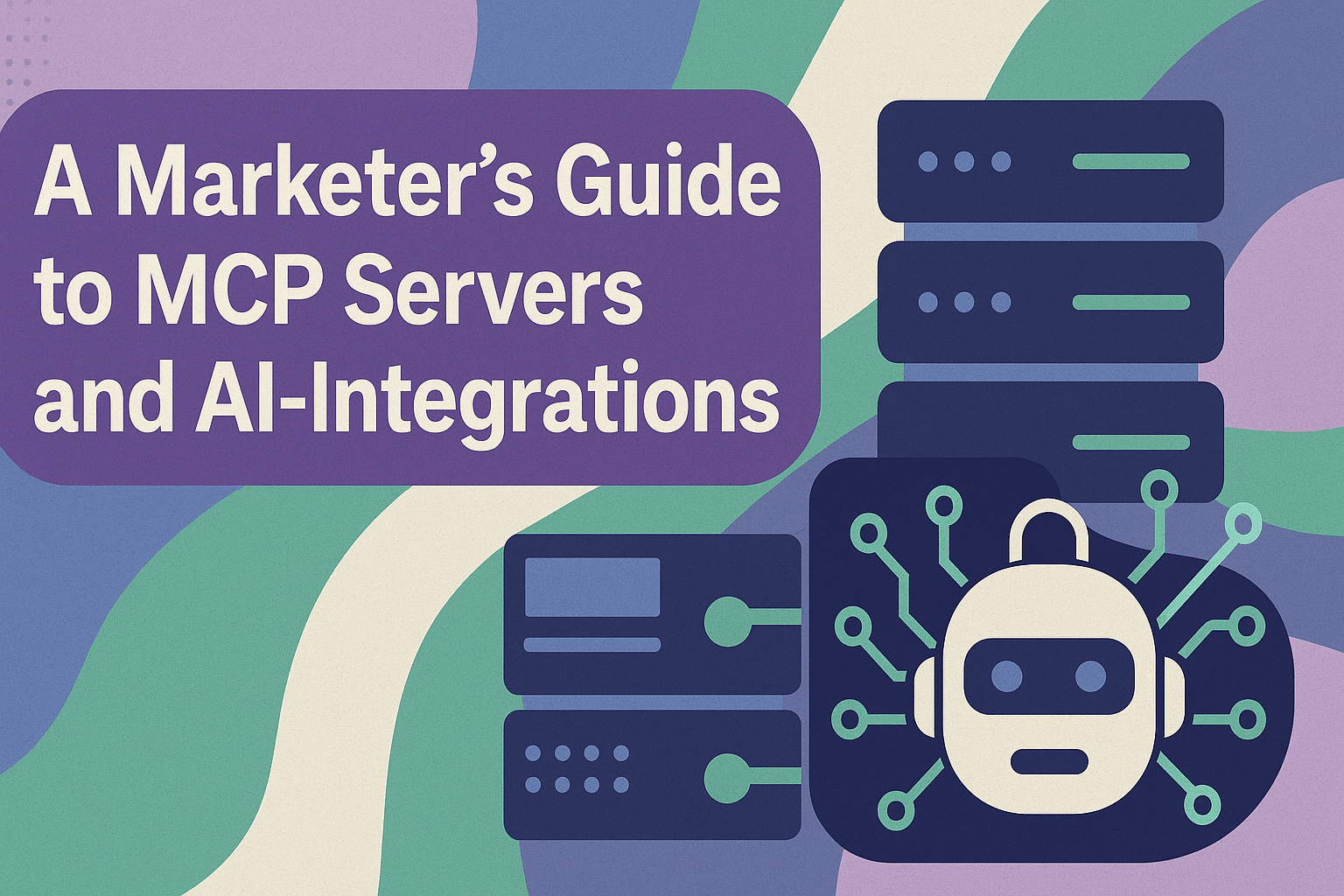Table of Contents
Ready to Streamline Your Marketing Operations?
Stop jumping between platforms and start commanding your entire tech stack through AI conversation. Our experts have helped companies across industries integrate their marketing tools for maximum efficiency.
Get a free marketing automation consultation
What Are MCP Servers? Your Marketing Swiss Army Knife
Think of MCP servers as professional interpreters at a global business conference. You have marketing tools from different companies (like attendees from different countries), each speaking their own technical language. Without an interpreter, communication is impossible. You’d need to learn each language individually—a massive undertaking.
An MCP server acts as that expert interpreter. Your AI (like Claude) tells the MCP server what it needs: “I want last month’s email open rates and the contact information for everyone who clicked our product launch announcement.” The MCP server knows exactly how to request this data from Mailchimp, formats it properly, and delivers everything back to your AI in a unified format.
This isn’t just another API connection. Traditional APIs are built for developers who write specific code for each integration. MCP servers are designed for AI models to use autonomously. They provide your AI with a “tool catalog”—a machine-readable menu of what each connected platform can do, what information it needs, and what results it provides.
This means your AI doesn’t just answer questions anymore. It becomes an active team member that can analyze your request, identify which tools it needs to accomplish your goal, and execute a complete workflow across multiple platforms.
For a SaaS company, this might mean analyzing trial user behavior across your product analytics platform, CRM, and email tool to identify users ready for upgrade outreach. For a healthcare organization, it could involve coordinating patient education campaigns across multiple channels while ensuring HIPAA compliance.
The End of Marketing Tool Silos
Every marketing team knows the frustration of fragmented customer data. Sarah’s email engagement lives in Mailchimp, her website behavior sits in Google Analytics, and her sales interactions are stored in your CRM. Getting a complete picture requires manual data export, spreadsheet manipulation, and a fair amount of guesswork.
MCP servers solve this by creating what we call a Unified Customer View (UCV). Instead of static dashboards, you get dynamic, conversational access to all customer data. Ask your AI, “Show me everyone who attended our fintech webinar but hasn’t requested a product demo,” and it queries all relevant platforms simultaneously to provide a complete answer.
This unified approach delivers several key benefits:
- – Consistent customer experiences across all touchpoints because you have the complete story
- – Deeper behavioral insights from connecting previously isolated data points
- – Improved data accuracy by identifying inconsistencies across platforms
- – Faster decision-making with real-time access to comprehensive information
- – Operational efficiency by eliminating manual data gathering
NisonCo has worked with companies across industries—from camps to real estate agents to regulated sectors like cannabis—and we’ve seen firsthand how data fragmentation limits growth. Companies miss opportunities because their email team doesn’t know about recent sales calls, or their content team creates materials that don’t address the questions prospects are actually asking. MCP servers finally break down these walls.
Your AI Chat: The New Marketing Operating System
The most transformative aspect of MCP integration is how it turns your AI chat interface into a complete marketing control panel. Instead of logging into multiple platforms, you orchestrate entire campaigns through conversation.
With an MCP-connected AI, you can issue commands like:
“Create a new contact in HubSpot for john.smith@example.com, add him to our ‘Enterprise SaaS’ segment, and trigger our industry-specific nurture sequence.”
“Analyze our last quarter’s LinkedIn Ads performance for healthcare decision-makers, identify the top three performing ad groups, and prepare a budget reallocation recommendation.”
“Find all sales calls from this month where prospects mentioned ‘compliance concerns’ and create a summary of their specific questions for our content team.”
These aren’t just data requests—they’re actionable commands that execute real work across your marketing stack.
Unlocking Customer Intelligence from Conversations
The most valuable customer insights often come from conversations, not clicks. Sales calls, support tickets, and client meetings contain explicit customer needs, pain points, and buying signals. But this conversational intelligence has been largely inaccessible for marketing automation.
Tools like Fireflies.ai are changing this by providing MCP servers that connect AI directly to meeting transcripts and call recordings. This means your marketing AI can analyze actual customer language to create hyper-personalized campaigns.
Instead of generic follow-up emails based on behavioral assumptions, you can create messages that directly address what prospects actually said. If a potential client mentioned struggling with “data integration challenges” in a sales call, your AI can automatically craft follow-up content featuring relevant case studies and technical solutions. For a manufacturing client discussing “supply chain visibility,” your AI could generate content highlighting your logistics tracking capabilities.
This conversational data also revolutionizes content creation. Rather than guessing what questions your audience has, you can ask your AI to analyze recent sales calls and identify the most common concerns. The resulting content is inherently more relevant and trustworthy because it addresses real customer language and needs.
At NisonCo, we’ve implemented this approach to automatically enhance our blog content with real-world context. When drafting articles about marketing strategies or industry trends, our AI can pull directly from team calls to include authentic examples and case studies. This dramatically improves our content’s Experience, Expertise, Authoritativeness, and Trustworthiness (E-E-A-T) because we’re not just sharing theoretical knowledge—we’re incorporating actual client challenges and solutions.
Choosing Your AI Platform: Claude, ChatGPT, or Gemini?
Your choice of AI platform determines how effectively you can implement MCP integrations. Each major platform takes a different approach to tool connectivity.
Claude leads the MCP revolution because Anthropic created the protocol. Claude offers native, broad MCP support through its user-friendly desktop application. You can connect to local and remote MCP servers with minimal technical expertise. Claude excels at deep reasoning over large amounts of text, making it ideal for analyzing lengthy call transcripts, market research reports, and complex customer data. For marketing teams focused on content strategy and customer intelligence, Claude provides the most straightforward path to MCP integration.
ChatGPT has great thinking models but requires more technical expertise to set up. The familiar web interface at chat.openai.com is primarily designed for individual tasks, not automated workflows. True marketing automation with ChatGPT requires using their API, which needs developer resources. However, ChatGPT’s MCP implementation is more restrictive—servers must implement specific search and fetch functions to work properly. This creates an app store-like environment rather than the open web approach of other platforms. ChatGPT remains the best choice for brainstorming creative campaigns and generating diverse ad copy variations.
Gemini prioritizes Google ecosystem integration over open MCP adoption. If your marketing stack heavily uses Google Workspace, Google Analytics, and Google Ads, Gemini can provide seamless native connections without needing external MCP servers. You can analyze campaign data directly from Google Sheets or create reports in Google Docs through natural conversation. However, connecting Gemini to non-Google tools requires intermediary platforms like Zapier, and maximum value remains concentrated within Google’s ecosystem.
For cannabis and emerging industry marketers, Claude typically offers the best balance of accessibility and power, especially given the complex regulatory content and customer intelligence analysis these industries require.
Getting Started: Your MCP Implementation Playbook
The thought of implementing “server technology” might seem intimidating for non-technical marketing teams. However, modern platforms have made MCP integration surprisingly accessible.
Start with Zapier’s MCP Server
Zapier provides the easiest entry point into MCP-powered marketing. Their MCP server connects to over 8,000 applications, including virtually every major marketing tool. The setup process is remarkably simple:
- Generate your MCP endpoint in Zapier with a single click
- Select specific actions you want your AI to access (like “Create Contact” in HubSpot but not “Delete Contact” for security)
- Connect to your AI by adding the generated URL to Claude’s desktop app
This three-step process takes minutes and instantly gives your AI the ability to execute real tasks across your entire marketing stack. Zapier offers 300 free tool calls monthly, making it easy to pilot this approach without upfront costs.
Unlock Conversational Intelligence
For teams ready to tap into their conversational data, Fireflies.ai became the first meeting tool officially listed in Claude’s MCP directory (also, check out our quote on their blog!). The integration provides secure, permission-based access to meeting transcripts, call summaries, and participant data.
Setting up the Fireflies.ai connection requires just one click within Claude’s interface for paid subscribers. The integration maintains enterprise-level security—neither Fireflies.ai nor Anthropic trains their models on your meeting data, and all existing user permissions are respected.
This connection enables powerful use cases like:
- – Voice-of-customer content creation: “Analyze our last 20 sales calls and identify the top five questions prospects ask about data security. Create a detailed FAQ blog post using their exact phrasing.”
- – Proactive customer success: “Review all client calls from the past month and flag any mentions of competitor names or dissatisfaction signals for immediate follow-up.”
- – Sales enablement: “Extract the most effective value propositions our top salespeople use when discussing ROI with manufacturing executives.”
- – Full-context communication: By connecting both email and call data to your AI, you can provide complete context for any client interaction. When drafting responses or brainstorming solutions, your AI has access to the entire relationship history—not just written communications, but actual conversations about challenges, preferences, and strategic priorities.
Building Your AI Marketing Team
As you become comfortable with basic MCP integrations, consider developing specialized AI agents for different marketing functions:
The Analysis Agent connects to Google Analytics, your CRM, and advertising platforms to provide comprehensive performance insights. Ask it to compare customer acquisition costs across channels or identify your highest-value audience segments.
The Creative Agent accesses your brand guidelines, product information, and performance data to generate on-brand, data-informed content. It can create ad variations optimized for your best-performing audience segments.
The Orchestration Agent connects to automation platforms like Zapier to execute complex, multi-step workflows. It can launch campaigns, route leads, and trigger nurture sequences based on specific conditions.
This specialized approach allows you to operate at a higher strategic level, directing AI agents rather than manually executing tasks across multiple platforms.
The Future of Marketing Operations
We’re moving from rule-based automation to goal-driven autonomy. Traditional marketing automation follows rigid “if this, then that” logic that requires constant manual updates. MCP-powered AI agents understand high-level objectives, create execution plans, and adapt dynamically to changing conditions.
This evolution enables revolutionary capabilities like self-improving lead scoring models that continuously learn from conversion patterns, and autonomous campaigns that optimize budget allocation and creative variations in real-time based on performance data.
For forward-thinking marketing leaders, now is the time to start experimenting. The technology is developing rapidly, and teams who understand the fundamentals today will be best positioned to capitalize when these capabilities become mainstream.
As cannabis and other regulated industries continue professionalizing and expanding into new markets, the companies with the most sophisticated, AI-powered marketing operations will have significant competitive advantages. They’ll respond faster to market changes, personalize more effectively, and operate more efficiently than competitors still managing disconnected tool silos.
Ready to Transform Your Marketing Operations?
The era of fragmented marketing tools is ending. MCP servers and AI integration offer a path to unified, conversational marketing command centers that can execute complex strategies through simple conversations.
NisonCo has experience helping companies across industries—from technology and healthcare to regulated sectors—optimize their marketing operations. We understand the unique challenges different industries face and the importance of building scalable, efficient marketing systems.
Our team can help you evaluate your current tech stack, identify the best integration opportunities, and develop a practical implementation roadmap that starts small and scales strategically.
Contact us today for a free marketing automation consultation
The future of marketing is conversational, connected, and AI-powered. Let us help you build your competitive advantage.



